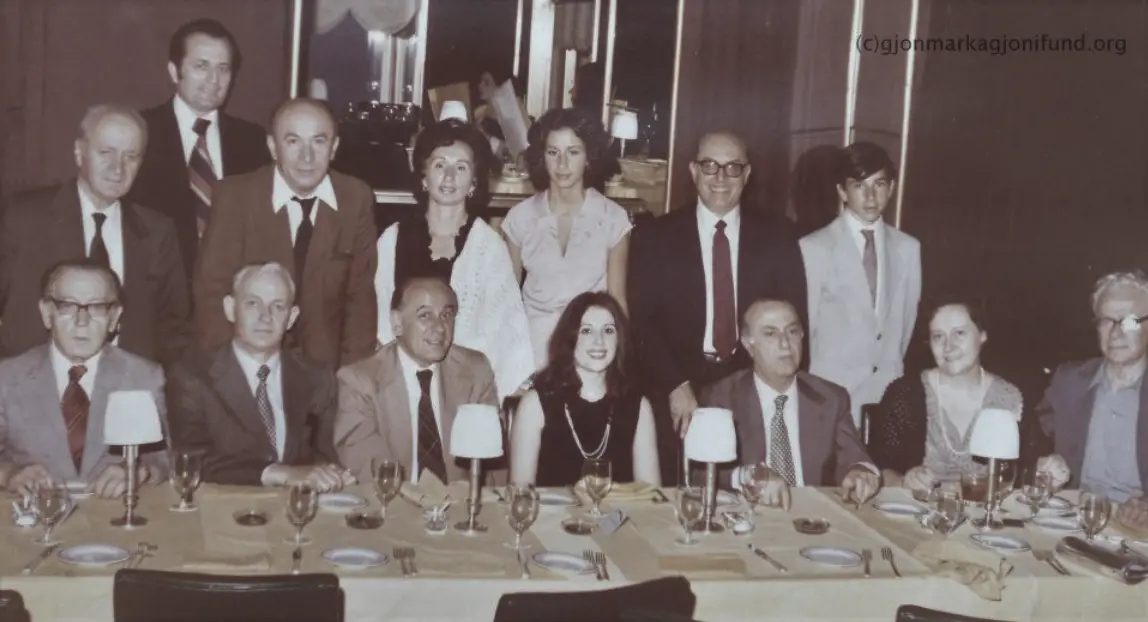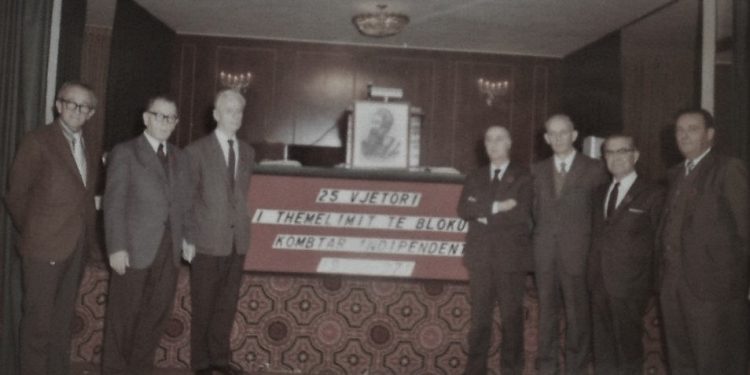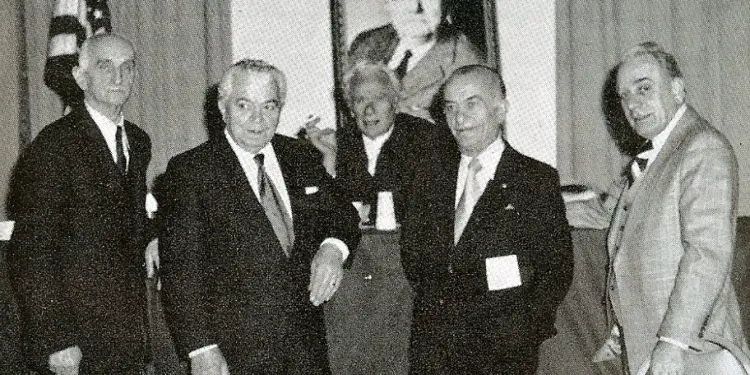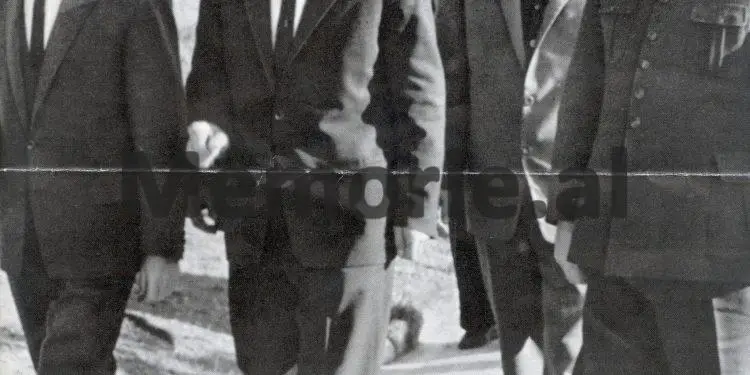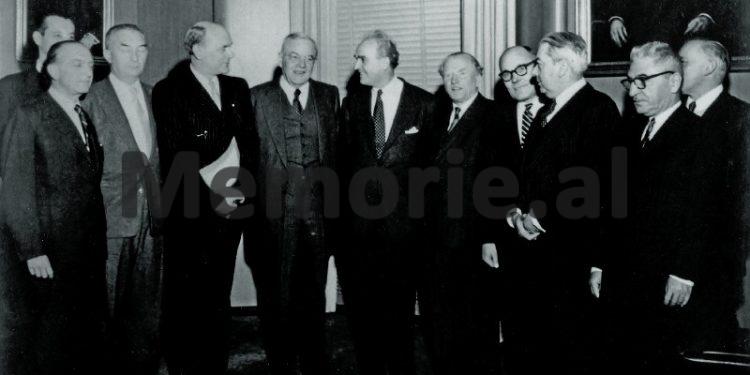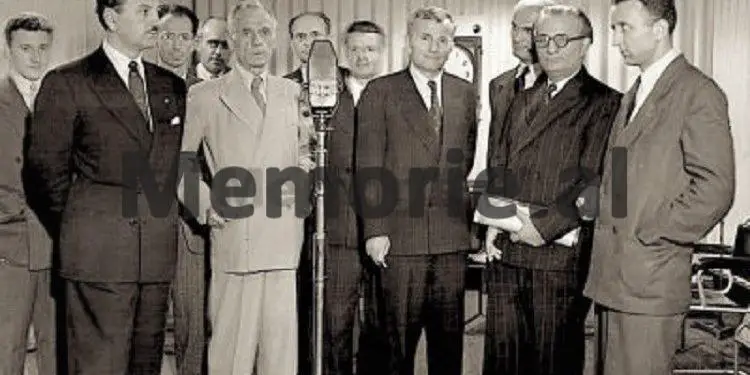By Dalip Greca
Memorie.al / “…When the questions and investigative processes of the Greek police were finished, Asim Jakova informed Reshat Agaj that they would soon go to the Llavrio Camp, where all the Albanian, Bulgarian and Yugoslav fugitives had gathered. Before leaving for the camp, in Asim’s personal home, Reshati, Asim and the American general, Beck, spent a full six hours of interview, with questions and answers, which Asim translated. In this interview, he writes in his diary that he opened his heart to the Americans and emptied the entire tragedy of himself and his brother, Pertefi. When he went to Llavrio’s camp, one day the Greek police took him to some offices of the American Mission, where he underwent the lie detector test.
Stripped from the waist up, they tied several different strands of wire to his body, which were connected to this machine, which vibrated every time it answered questions in Albanian, yes or no. An American technician would review the questions and answers and determine from the machine’s vibrations whether he had told the truth or was hiding some secret. Asimi told him later that the technician had said in his report that Reshat had hidden the truth in the first questions and told the truth in the other questions.
– I, – Asim told him afterwards, – I argued with him, because I am sure that you are an intellectual from a noble house and you are not a communist agent, instructed to deceive us. I signed, assuring the Americans, with my life, that, in case you are a communist agent, I will be punished the same as you. The personal signature of Asim Jakovo was later confirmed by the American captain Johnson, who headed the office for Albanians, when Asim was no longer serving there, but had been transferred to another country. Reshat’s case was taken into special consideration by the Americans, through all their channels, and the whole situation was reported to the center in Washington, as Asim Jakova told him in confidence.
When the American office in Athens proposed to those in Washington, to send Reshat to Italy and use him for contacts with the communists of the Albanian Mission in Rome, those in Washington responded like this: “We have no interest in the services he can bring us Reshat Bajram Agaj. We are only interested in saving the life of Pertef Bajram Agaj”!
Reshat writes in his diary: “This telegram from Washington, as Asimi told me, made such an impression on my soul that I have never had in my heart anything but the highest feelings of admiration and deep gratitude for the people true American, for what protects and preserves in the soul the excellent traditions of this new people, traditions of humanity, mercy and freedom.
My Albanian “brothers”, like Kadri Hazbiu and his friends, demanded without mercy and without pain, that I should be crushed to the ground and become their dirty tool, against the poor refugees, who were fighting against a regime that was the head of feet in the service of the Russians and Slavs, while the unknown Americans overseas, nurtured very high feelings of humanity and mercy for me and my brother. My gratitude to them crosses all boundaries and I am eternally grateful. May God’s light and salvation be poured out upon this nation and upon this people?”
In his notes, Reshat does not forget the financial help that Asim Jakova gave him. When Asim left for America, he recommended Reshat to Captain Johnson, a Nordic man, about six feet tall, from Milwaukee. During the War, Johnson had spent four years in the mountains of Hungary, in the German rear, and had miraculously escaped from the pursuit of the Gestapo, thanks to an American counter-agent, who was in Budapest, with the rank of major in the German army. The story of Captain Johnson was indeed a story, almost legendary. Passing through Hungary, Croatia and Italy, dressed as a Croatian diplomat, he was able to reach the American army lines in Italy.
The first desire that appeared to his superiors after six years of service and separation from his family was to be able to visit his mother in Milwaukee. High command indulged Captain Johnson by making a special plane available for him to travel to his mother. Captain Johnson knew many languages. He also spoke Italian very well. Reshati used this language to communicate with him, because at this time his English was lame. With Captain Johnson, they only talked about the affairs of the camp and never, although he knew it very well, did he mention the mess with the communists of Tirana.
At this time, after the escape of Miftar Spahi, Reshat had become the head of Legality in the camp and often went to Athens, regarding the problems of the camp, because at this time the Americans had released funds to be spent in favor of political refugees and naturally, there were disagreements about how these funds would be distributed. When Captain Johnson was busy with other things, the one who was dealing with Reshat was a young Albanian-American boy, born in America, whom he only knew by the name, Peter. He spoke a beautiful, Korçare Albanian.
“Did the Pope return to the Vatican”?
It was January 1952. After a year and a half stay in Greece, the center decided that Reshat should go to Italy. Before he left for Rome, the Albanian-American Peter took him from the camp and kept him in a beautiful hotel in Piraeus for almost a week. Every night he invited her to dinner, taking her to the fine restaurants of Piraeus.
The departure from Athens was made by means of a British plane. He was escorted to the airport by Peter, with his car. When they were in the middle of the road, Peter stopped the car and carefully checked Reshat’s suitcase. It was the first time that Peter had done the job, as agents of secret affairs do that until then their work had been done in good faith. Peter took with him the notepad, a gold coin, which his wife, Drita, had given him as a souvenir and a bond – with Italian lire. The bonds and gold were returned to Italy through Gaqo Gogo, but the notebook was never returned.
When Peter gave him some dollars and his passport and hugged Reshat, he said these words in English: – “I’m going to work for Albania, for America and for Freedom”. Peter was very pleased and, embracing her once more, they parted never to meet again. Arrived in Rome in the early evening. He boarded a bus, giving the driver the address he had given him in Athens, Peter, in agreement with the Rome office. When he got there, he found himself in a difficult situation; the address was fake.
Desperate, he took a seat in a nearby hotel. This was the first surprise that the Italian gentlemen gave him, and he was greatly disappointed. He was waiting for the Italian agent, Mr. Marconi, to come, who had to give him the slogan: “Did the Pope return to the Vatican, or not?” and Reshat would answer: “Yes, he returned.” But no one showed up. The next day he went out. A gentleman of medium build approaches him and speaks on his behalf. He was surprised and did not know how to act because he expected the slogan.
But he, as the Italians are used to, who take everything as a joke, when he saw that Reshat was thinking and puzzled, he said laughing: – “Come, come here, because we know that the Pope came to the Vatican”. The Italian took him to the house they had rented for Reshat. After a few days in Rome, he met with Gani Tafili. The police were angry, because he should have remained unseen. His going out was harmful, since at that time there were many Albanians around. The Italian Marconi and his bosses did not have that much faith in Reshat.
The meeting with Abaz Kupin
Reshati was feeling that his stay in Rome, where all Albanians used to go to cafes, created endless rumors about him, and of course, street words were talked about, as much as you want. The words coming from Albania from Laze Bërdo and Ahmet Belushi, who had said that not all those involved in the Pertefi process had been shot, had circulated everywhere.
At that time, the Committee of Albanians there was complete and engaged in subversive work inside Albania, and doubts were, of course, great. The peak of these rumors reached when the American agent Lee, near the Committee, told Abbas Kup, that Reshati was sent by the communist government and that his secret name was “Remo Giovannini”. When he went to Abazi, he showed Reshat the name written on a pad. Answered Abbas aga, right then and there:
– “I am neither a traitor to Albanian nationalism, nor a traitor to the Legality Movement, but, if you have patience, I want to talk to you face to face, to explain to you how things are.” I went aside with the great old man of our mountains and explained to him the whole tragedy of me and my brother. After listening to me, he kissed me, telling me with his heart: – “You have me, don’t break your head at all”. As long as he stayed in Rome and in the camps of Italy, the table of Abbas Kupi and the gate of his house were open and welcoming to Reshat.
Reshat writes in his diary: “I thank his soul from the bottom of my heart. May God feel him there, where his bones are dissolved! And when I explained to Abas aga, the last meeting with my brother and with the Security officers, Bazi let out a sincere sigh and said: The desert…”?! He spent almost three months in Rome, without anything happening to him. Reshat writes in his diary: “I was just a single cog in that big wheel of the secret services”!
One day a policeman comes to him and tells him to report to the police in Rome, because he had to leave that city. He took the suitcase and went to the police. They told him that, since he had nowhere to go, they would put him in the refugee camp without a country, in Fraschette, a closed camp for suspicious and dangerous people. A policeman escorted him that night to Frosinone, where he was detained in the city jail. At Fraschette, it arrived the next day. In prison he met hundreds of Italians and foreigners of every nationality, left on the streets.
The next day they escorted him to Fraschetta’s camp. A deep sadness gripped him there. In the diary we find this note: “This is where my existence ended, as a special individual. All those who were locked up here were called by a number, and no longer by name. My number was 6339. My confinement here made a bad impression from all sides and of course many thought that I was a communist agent and dangerous, because they locked me in this camp, where there was no freedom of exit, except with a special permit”!
At that time, his cousin, Ago Agaj was in Egypt. He became very worried and through King Zog, he got interested in Reshati making a plea to be taken into the service of the English news service, B.B.C., since they were looking for a stenographer. He replied that he could no longer do that job. Agoja did not know that Reshati could not make any move without permission. However, through Ali Këlcyra, Agoja sent him a pair of clothes from Egypt. From Rome, from the Party of Legality, they sent him some money, which helped him a lot to go to Fiuggi, for the kidney cleansing cure. When he went to this camp, his kidneys started to hurt a lot and a medicine he had taken in Rome had no effect.
Witness to communist violence
One day he is sent to the camp by Abaz Kupi, Gani Tafili and Selim Damani, who inform him that the “Free Albania” Committee had requested that Reshat go to Rome and expose the internment camps that had set up the communist government of Albania. They couldn’t find anyone else who could accurately testify to communist violence. Reshat had gone through those forced labor camps. He had come out alive from the Maliq Swamp camp, from the hellish place. The Agrarian Party of the National Front presented Skënder Duma, who had been imprisoned and had worked for a year in the Maliqi Camp.
At first, the plan was for the two to go to testify before the United Nations Special Committee on “Human Rights Violations”, based in Geneva, Switzerland, but, as Selimi and Ganiu explained, the government of Switzerland did not allow them to go there, because it did not want to add trouble to itself, by antagonizing the countries of the iron curtain and especially Russia, which at that time was Albania’s lord. The committee had decided to present Reshat before a press conference in Rome, where the entire leadership of the “Free Albania” Committee, headed by Hasan Dosti, foreign diplomats based in Rome and Italian and foreign journalists would participate. Reshat’s entire speech would be made in Italian, which he knew as the Albanian language.
In the newspaper “Flamuri”, July-December 1952, it was written: “Then Mr. Hasan Dosti, presented a man who escaped from the concentration camps of captive Albania, Mr. Reshat Again, which depicted suffering, torture and burial alive in a chilling manner. Journalists were very interested in this direct contact with facts and people who are rare and living evidence of communist barbarism”. (Taken from the book “Hasan Dosti, a life for the Albanian issue”, page 203).
Reshat’s story about Maliq’s Swamp, because there he had spent the most terrifying and terrifying six months of his life, had been translated into Italian and he had only to read it. He was taken the day before the testimony in Rome and, by order of the American Lee, who was in charge next to him; he had to be dressed badly. Reshat’s appearance in front of the dignitaries who were there, with the fluency of the Italian language, made a great impression and the next day all the newspapers of Rome, some with his photo, gave the news of this press conference. On this occasion, the “Free Albania” committee issued a special bulletin in three languages, Albanian, English and Italian, with the story and history of Reshat.
Years later, when Reshat was in Canada, the US Senate issued a small pamphlet on Albania and its occupation by communism. In this booklet, the last two pages are filled with his stories about the forced labor camp in Maliq and the life of the prisoners in that camp. Not long after, he was transferred to the Marcatello camp, near Naples, where many other Albanians had taken refuge. He went there in August 1953 and on March 1, 1954 he left for Canada, the North American continent, the land of lakes and ice.
Provocation, letter from brother and departure for Canada
One day they sent him a letter from Milan, with the name of a completely unknown man. When he opened this letter, he recognized the handwriting of Pertef, the hostage brother. He wrote that he was fine and believed that Reshat was also fine. Of course, this letter was dictated by those of the State Security in Tirana and was sent to him from Milan, so as not to arouse any suspicion or be censored. The letter calmed him a lot, because it gave him the news that Pertefi was alive and that things were going well, regarding his stay abroad and everything was in order. But poor Reshat did not know that his brother had been shot in 1951!
After receiving the guarantee to go to Canada, Reshat turned to the Ministry of Foreign Affairs to issue him a travel document as a refugee, to travel to the unknown country, where his new shelter would be. Rome rejected his request. Then he turned to the Greek Foreign Ministry in Athens, where he came out for the first time, and they immediately sent him the document he was looking for, and so, after visits to doctors and an interview at the Canadian Embassy in Rome, he prepared to leave for Rome. Canada, on March 31, 1954, where Hekuran Shaska, who had sent the guarantee, was waiting for him.
He left Naples on the “Vulcania” steamer for Halifax, Canada, together with hundreds of Italians and his friend, Zija Boriçi, from Shkodra. 15 days of rough, powerful and stern sailing passed, in the middle of the ocean, whose waves lifted and lowered the whole steamer like a small boat. After much trouble, they arrive in Canada.
NEW LIFE IN TORONTO, CANADA
On April 1, 1954, together with the ship Boriçi, they landed in Halifax, the coastal city of the province of Nova Scotia, where they were received by the people of the World Council of Churches, who were the mediators of their arrival in Canada. They helped him get on the train to Toronto. After nearly four days of travel, the train arrived in Toronto, where Hekuran Shaska and Veledin Çapoj met him. The whole country was covered with heavy snow. Reshat fell ill with a cold and stayed within a week. He had a strong cough and fever. Life was difficult, so that he was often in deep despair, because work at this time could not be found and his English was still uncertain.
He tried to work as a dishwasher and changed many places, because they fired him, because they hired younger people who did the job better. He wrote letters all over the world to Jakovo and others, to have some help in finding a job according to his profession, but no help was given. Even where he started working as a dishwasher, they sent an Albanian informant to observe him. It seemed that he was introduced, because he disappeared quickly and when he met him later, he was trying to hide from Reshat. He looked at what he would do and how he would react to the job as a dishwasher.
Reshat asks himself: “And who sent him?! Who knows! Of course, Canadian services, boosted by their southern counterparts. I understood this well because he, who was watching me work on the dishes, ran away the next day and I didn’t see him coming again. Later I got to know this gentleman very well. He was a certain vagabond from Shkodran, and when I once spoke to him in the Greek restaurant where he had been to notice me, he did not like to speak at all and turned a deaf ear. He was an Albanian who had served in the English services in Greece. I don’t mention his name, because it doesn’t matter”!
He suffered a lot until he found a regular job at Dominion Citrus in the summer of 1955. Here he calmed down enough that for 13 years he worked summers in St. Davids and in the winter, in Toronto. In St. Davids was both head of the office and treasurer, so it was an office where one man does everything. It felt good there, because the village was beautiful and full of trees, all summer long. In Toronto at that time, there were many Albanians who fled like Reshati and were active in the Royal Legality Movement. At that time, they published several different issues of a local newspaper, called “Djaleria”, whose main collaborator was Reshat Agaj.
Reshat became active in politics, being a lively activist in the King Bird Party. But it seems that he regretted this time spent. He writes: “For 26 whole years…I think that being active in the party was a very big mistake, which cost me a lot, both financially, and in destroyed nerves and lost time, making enemies of those who do not they had to become enemies because they were also my people, and people who have done me and I have done good to them, not bad. Mixing the Albanian with politics is a haram mixture, an explosive and very bitter mixture, because the Albanian does not understand and does not practice politics, except as a function of his terrible ego and his extreme individualism and, without any what human and moral principle.
Looking at these long years of Albanian politics in exile, I do not hesitate to say that there will not be and never will be real democracy in Albania. Only if one day the supreme power of the Creator of the Universe will order to fundamentally change the dough of the Albanian’s being, rough and wild dough, and dough created for confusion, unprincipled wars, slander, misplaced and without cause. At the foundation of the individuality of the Albanian, are the Greek, Italian and other more distant foreign influences, plus the religious divisions of the time. From here, we get a terrible nastradini soup, which is better noticed than anywhere, in the Babylon of today’s Albanian exile”.
Note: The author, Dalip Greca, wrote the article when he was the editor of the ‘Albania’ section in the “Illyria” Newspaper in New York. To Gjonzeneli and his wife, the granddaughter of Reshat Agaj, Finlanda (who live in New Jersey), the daughter of Pertef Agaj, who was shot by the communist dictatorship, entrusted the “Ditar” yellowed by time to the journalist. The writing was created by the “Diary of Reshat Agaj”, who, together with 50 thousand dollars, had bequeathed it to his friends in Kenosha, Wisconsin, USA, to be sent to his family in Vlora, after his death, but with the condition: after communism fell. This particular diary was computerized by Dardanesha Andoni Gashi and edited by Dalip Greca.
The diary-book “Vellai i pengu” was very successful in Albania and has so far received three editions and there are still requests. Also with the “Ditar” several dossiers were built, which were published in the “Illyria” Newspaper and in the newspapers of Tirana. Reshat Agaj, a graduate in Italy, a nationalist intellectual, was a victim of the system, but he had the courage to denounce it to the Americans and did not cooperate with the State Security, which held his brother hostage and then shot him. For some time, Reshat Agaj served as the Chief Editor of the “Atdheu” newspaper. He cooperated with “Dielli” newspaper, “Sxhiptari i Lire” newspaper of the “Free Albania” committee, and other anti-communist newspapers in the diaspora. Reshat Agaj’s remains still rest in Detroit. Like many other nationalists, he is waiting to return to his homeland. Memorie.al




